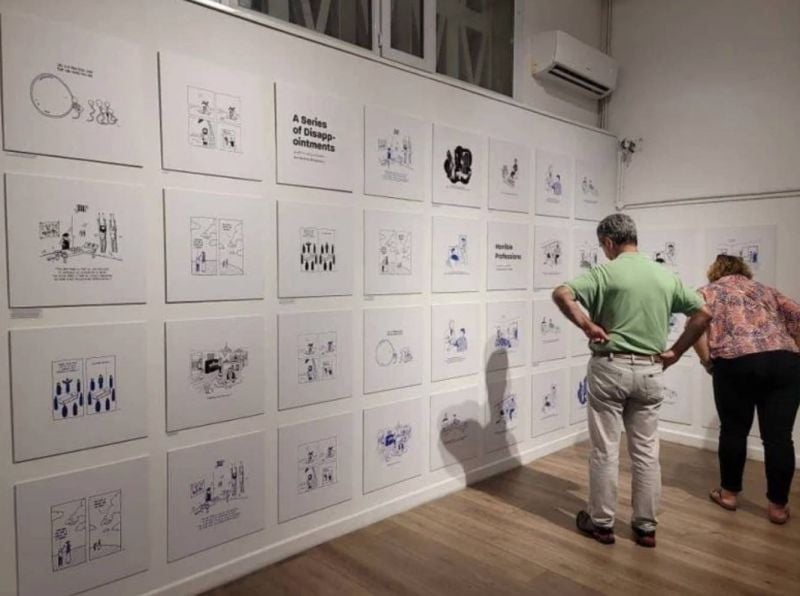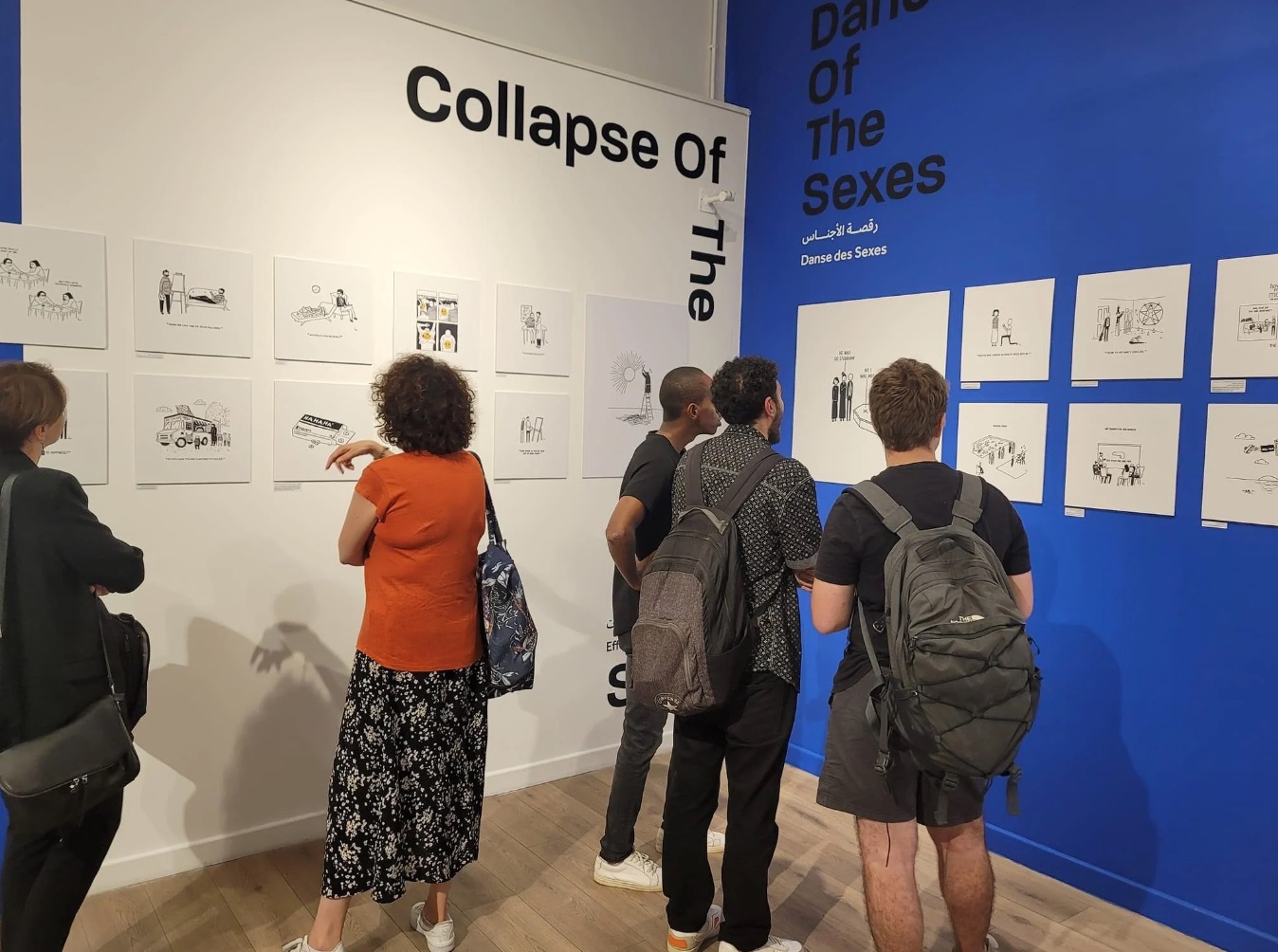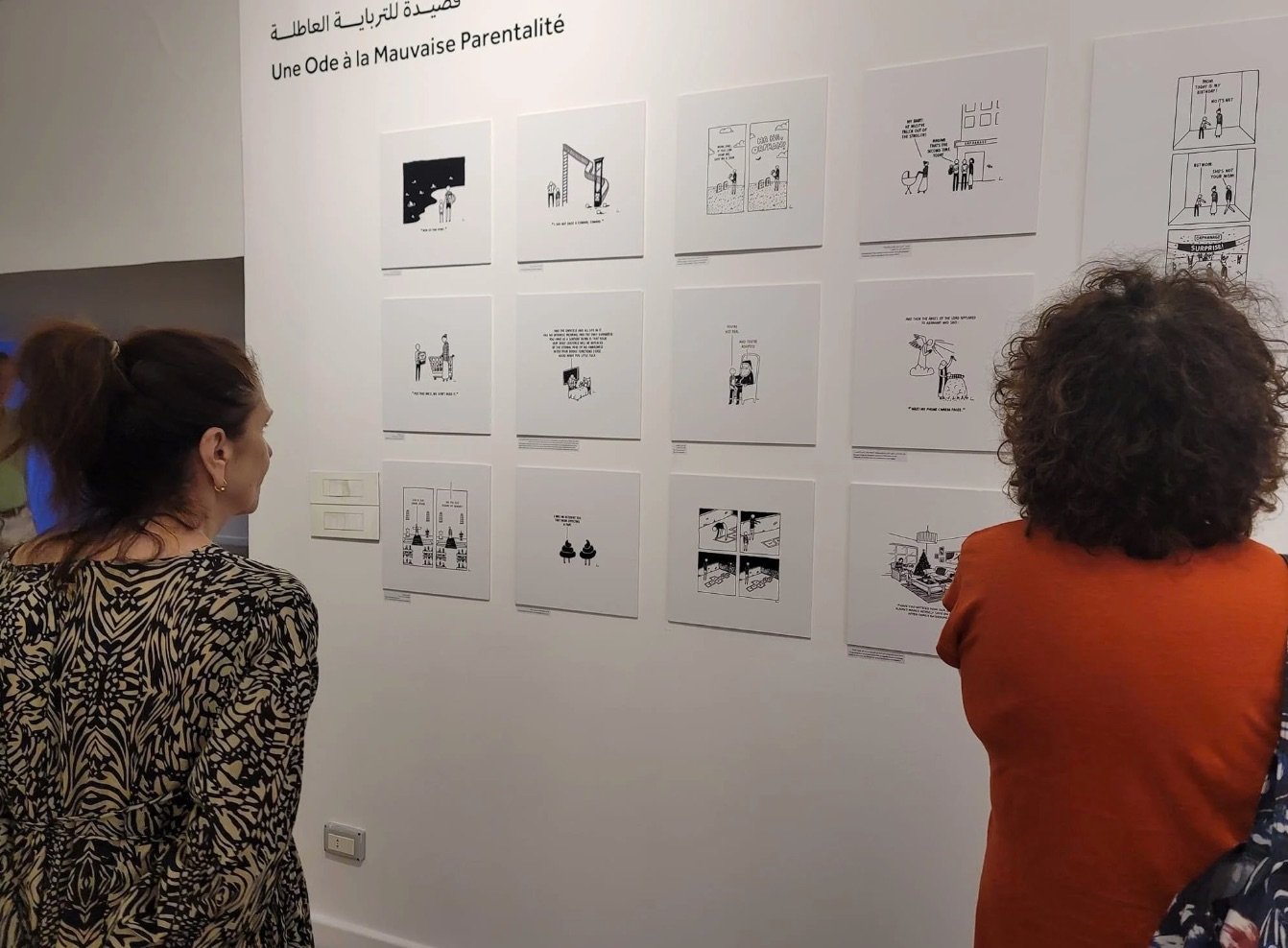
(Credit: Global Cultural Services GCS via Facebook)
On the first floor of Dar El-Nimer for Arts & Culture, the walls are bathed in magnificent shades of white and blue — a suitable backdrop for a journey through rooms filled with the drawings of cartoonist Bernard Hage, better known by his alias, the Art of Boo. Behind the exhibition, titled “Non Political Hassles” is Haya el-Bizri, whose subtle and eye-catching curation guides viewers through a voyage of introspection that leaves one smiling at messages that are simultaneously funny, hard-hitting, and at times despairing. The way Hage’s art seems to mirror real-life, particularly in Lebanon, is not mere coincidence, and el-Bizri has highlighted the fact.
Using ink, Hage transformed the absurdities and stress of everyday life into moments of witty humor. His work leaves us crying, then suddenly laughing at ourselves, at the country and at the world at large — all of which have seemingly gone insane. Boo’s art is precisely the kind of therapy we need in these crazy times, and over the years, L’Orient-Le Jour has had the satisfaction of regularly publishing his work within its pages.
We had the pleasure of getting up close and personal with Hage (Boo) ahead of the exciting exhibition.
Q- Why this exhibition? Why “Non Political Hassles?”
A- You know, political life in Lebanon has turned into a never-ending loop of gloom and monotony. If you keep following it closely and keep making comments on it, there’s a real risk of getting sucked into this vicious cycle of eternal frustration and despair. And believe me, this is coming from someone who thrives on poking fun at depressing politics.
In Lebanon, it’s like a broken record. The same issues keep resurfacing year after year, and, frankly, I’ve run out of fresh ideas to tackle these recurring problems. At one point, I even toyed with the idea of addressing current issues by simply referring them to my previous book: “For a cartoon about a prime minister who can’t form a government, see pages 38, 39, 40, and 41,” or “For a cartoon about bad economic policies, flip to pages 68, 69, 70, 71, and 72,” and so on…
 Scenes from the exhibition. (Credit: Global Cultural Services GCS via Facebook)
Scenes from the exhibition. (Credit: Global Cultural Services GCS via Facebook)
Time has shown us something important: the absurdity of the Lebanese reality surpasses even the wildest works of fiction. Politicians in Lebanon have become so disconnected from reality that their actions and statements inadvertently veer into the realm of comedy. I couldn’t possibly compete with that; they’ve essentially put me out of business!
Anyhow, the situation in Lebanon has become so saturated and unbearable that we’re in desperate need of a break from all the political chaos. Fortunately, there are plenty of other life struggles and failures that I, as a cartoonist, can nag about. So, this exhibition is designed to offer a window or a breath of fresh air – a brief escape from the daily grind in Lebanon by providing some light-hearted commentary on non-political subjects, for once. Un petit changement d’air.
Q- How did you go about choosing the illustrations? Were they all inspired by the Lebanese state of mind?
A- The drawings depict various social scenarios, including dating, parenthood, and mental health, among other topics. While the illustrations’ themes and humor are generally relatable, a Lebanese audience may find particular resonance in the aspects related to mental health and despair. This is due to the ongoing cycle of turmoil that Lebanon has been caught in since the crisis began in 2019, a
cycle that continues to deteriorate to this day.
On a personal note, I’ve grappled with depression since I was 14, and I’ve always explored this theme in my work. Sometimes, I’ve approached it dramatically through poems and dark illustrations, and at other times, I’ve used lighthearted cartoons. I’ve consistently channeled my anguish and despair into my art with humor. However, what I’ve observed in recent years is that these drawings of despair have been resonating with more and more people, and there has been a noticeable increase in the number of individuals who relate to this type of humor and these themes. This is evident in the reactions I receive to my drawings.
Q- Are the pictures for sale?
A- The drawings have been printed and mounted on foam boards exclusively for the exhibition, and they are not available for sale at this time. Nevertheless, should my current modest income persist, I may reach out to you at a later date with an update.
Q- Can cynicism save us from despair?
A- To me, using humor to cope with despair can provide a temporary sense of immunity. But you can’t joke around forever. I personally tried, but it really doesn’t work like this. Humor is the sort of medication that could help one get through a certain illness, yet it cannot heal. You need other supplements. And if other supplements are not available, your desperate dependence on humor as your sole form of remedy becomes somewhat toxic, like a drug. And drugs work really well,
 (Credit: Global Cultural Services GCS via Facebook)
(Credit: Global Cultural Services GCS via Facebook)
temporarily. The problem is that they don’t work on any ongoing basis, and eventually, they just wreck you and make you feel worse.
In simpler terms, while humor is crucial for getting through a crisis, it’s not the only thing you need. If people choose to do nothing but laugh all the time, their passive reliance on humor during a crisis may prevent them from taking actual steps to address and resolve the crisis. Does that sound familiar?
So, in response to your question, I believe that humor can be a lifesaver, but it can also be harmful. It’s a double-edged sword.
Q- What is the difference between cynicism and humor?
A- Cynicism and humor are two distinct concepts with different core purposes and emotional tones.
Cynicism has a skeptical or pessimistic outlook on life and human nature, while humor is generally lighthearted and intended to create amusement or joy. The magic happens when they both intersect.
If you ask me, cynicism and humor are two sides of the same coin, which is despair. I believe that cynic humor is the politeness of despair. I think of it as a tamed monster.
Q- Are Bernard Hage and Boo the same people?
A- According to my core beliefs, no, they are distinct entities. However, according to my therapist, the answer is yes, and I might need to up my medication dosage.
I created this alter-ego mainly as a form of self-protection. You see, I’ve always been somewhat reserved and timid, often dealing with social anxiety and perpetually sweaty hands. I worked hard to please everyone around me, which became exhausting. Creating an alter-ego provided relief; it allowed me to express thoughts and feelings I’d normally keep to myself. It gave me the freedom to let people down without being overly concerned about the repercussions, and it felt liberating. I believe that disappointing people is very important.
So, my alter-ego, known as Boo, allowed me to assume a persona I didn’t dare to be: pessimistic, indifferent, and outspoken. That’s the worst combo ever.
Over the years, both characters began to influence each other. It’s like when you spend a lot of time with a friend, and eventually, you start adopting their mannerisms or phrases, you know? So, certain aspects of my behavior were inspired by my alter-ego’s behavior, and vice versa, until they melded
into a single character.
That’s been my journey towards becoming a responsible, confident, and self-assured adult. I apologize to my 50 thousand Instagram followers for having to witness it.
Q- What has it been like since you moved to Berlin and what are your plans for the future?
A- My arrival and settling in Berlin were about as straightforward and simple as a Kandinsky painting. I dedicated a significant amount of time to understanding German bureaucracy, with the rest of my time devoted to various projects.
Over the past two years, I’ve been involved in several projects. One notable collaboration was with UN Women, focusing on gender equality and women’s rights in Lebanon, which was released in September 2023. I also published my comic, “The Philosopher,” selected as one of the five winners in the 2022 Comic Art Europe open call. It was exhibited in Beirut, Lyon, The Lakes UK, and the Comic Art Museum in Brussels.
Additionally, I released a music album titled “Kaput” and performed it live in Berlin in July 2023.
I’ve been also working on my upcoming book, “Malaise” (Diaries from the Paris of the Middle East), a compilation of my personal notes, drawings, letters, and diaries created from the beginning of the crisis in Lebanon in 2019 until my immigration to Berlin in 2021. The book is currently under review by my agent and is expected to be released in the next couple of years.
Currently, I’m engaged in a fascinating project titled “The Great Map of The Crisis” a collaboration with the Lebanese Association of History. This will be my first project in Arabic, and I’m very excited about it. I’ve worked with Lebanese researchers and historians to identify various aspects of the current Lebanese crisis and trace the historical patterns that led to it. In addition to my humorous drawings and writing, this project will also showcase my acting skills! It’s anticipated to be released in
spring 2024.
Furthermore, I’m working on an autobiographical comic book that holds a special place in my heart. In this project, I’m experimenting with different drawing techniques, but it’s still in its early stages, so it won’t be out anytime soon.
Finally, I’m currently managing two design and branding projects, and I won’t delve into the specifics at this moment.
So, there you have it—these are the projects that have kept me occupied for the last two years. Mom, if you’re reading this, now you know why I haven’t been returning all your calls.
Q- Can we laugh at everything? If not, how can we make people laugh at a time of such terrible wars?
A- Laughter is a physical and vocal expression associated with the emotions of amusement and joy. It’s important to note that not everything in life will necessarily bring joy or amusement – unless you’re living in a Coca-Cola commercial. Thus, it’s perfectly fine if we don’t always find reasons to laugh.
I’ve observed that there’s a tendency in human society to expect continuous laughter or constant displays of contentment, especially in the digital world, as if we’ve developed a capitalist approach to humor. While laughter and joy may garner more views, likes, and shares, they are not more important in real life than other human emotions like sadness, anger, fear, or surprise. As a person striving to maintain their sanity and as a cartoonist, it’s crucial for me to strike a balance between
these emotions, even in my work with humor.
In my view, one can find humor in almost anything that strikes them as funny. However, during times of war and atrocities, it’s perfectly acceptable not to find amusement in the situation. There are moments when it’s alright to be sad, to reflect in silence, as these less popular emotions also offer a sense of relief. The good news is that no matter how long they endure, these feelings will eventually subside, in line with the laws of universal balance, and laughter will invariably find its way back into our lives.
"Non Political Hassles" will showcase at the Dar El-Nimer art center in Clemenceau until Dec. 2.
This article was originally published in French in L'Orient-Le Jour.
